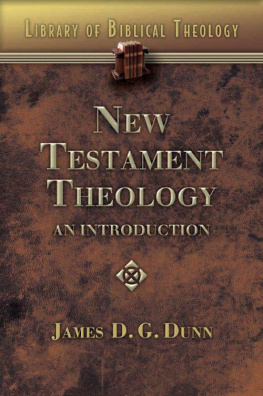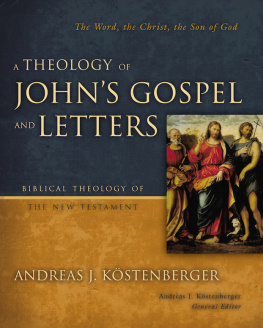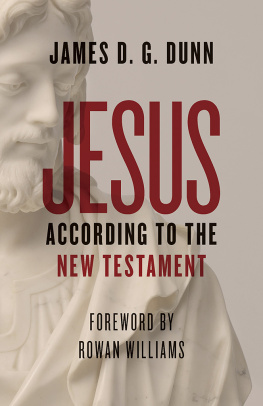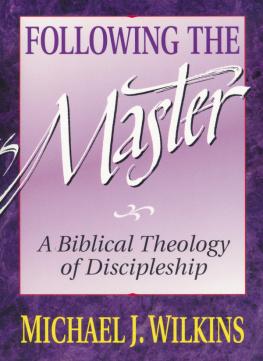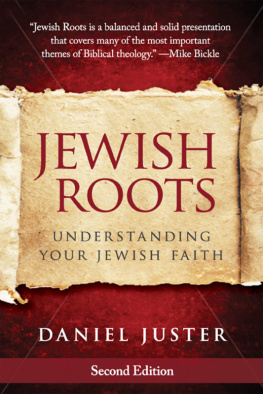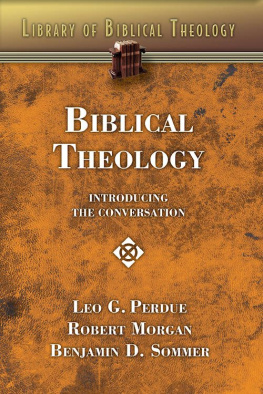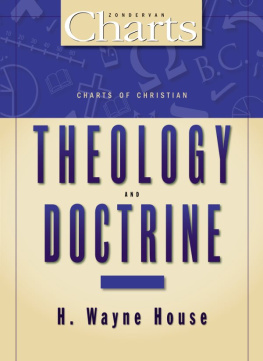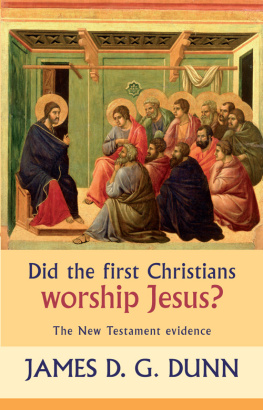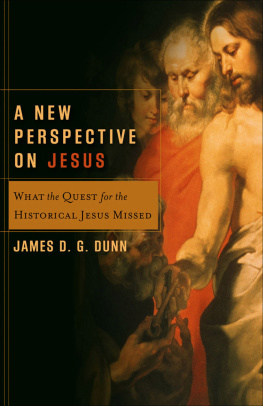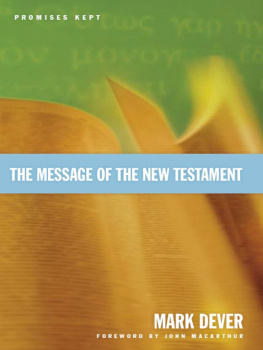James D. G. Dunn
L IBRARY OF B IBLICAL T HEOLOGY

N EW
T ESTAMENT
T HEOLOGY
AN INTRODUCTION
JAMES D. G. DUNN
Abingdon Press
Nashville
NEW TESTAMENT THEOLOGY:
AN INTRODUCTION
Copyright 2009 by Abingdon Press
All rights reserved.
No part of this work may be reproduced or transmitted in any form or by any means, electronic or mechanical,photocopying and recording, or by any information storage or retrieval system, except as may permitted by the 1976 Copyright Act or in writing from the publisher. Requests for permissionto Abingdon Press, P.O. Box 801, 201 Eighth Avenue South, Nashville, TN 37202-to permissions@abingdonpress.com.
This book is printed on acid-free paper.
Library of Congress Cataloging-in-Publication Data
Dunn, JamesG., 1939
New Testament theology : an introduction / James D.G. Dunn.
p. cm. ((Library of biblical theology ; 3)
Includes bibliographical references and index.
ISBN 687-34120-7 (pbk. : alk. paper)
1. Bible.T.Theology. I. Title.
BS2397.D835 2009
230'.0415dc22
2009003083
All scripture quotations are taken from the New Revised Standard Version of the Bible, copyright 1989, Education of the National Council of the Churches of Christ in the United States of by permission. All rights reserved.
09 10 11 12 13 14 15 16 17 1810 9 8 7 6 5 4 3 2 1
MANUFACTURED IN THE UNITED STATES OF AMERICA
" src="images/00002.jpg" class="calibre2"/>
CONTENTS
" src="images/00002.jpg" class="calibre2"/>
INTRODUCTION
How should a theology of the New Testament be written? The question begs a number of issues that will have to be addressed before we can begin the task itself. Does the title refer to the theology espoused by the writers of the NT documents, or the theology of the documents themselves? And so, should we speak of theologies (plural) rather than theology (singular), or does the title (NT theology) suggest a search for the shared theology of (all?) the NT writers, assuming that they had such a (singular) theology? Or is a theology of the NT always just thata theology, rather than the theology? That is to say, is a/the theology of the NT always in part at least a matter of the present-day writer's interpretation of the NT documents? Some indeed might want to speak rather of a theology that emerges from the encounter between the present-day reader and the first-century texteven of a heology created by the encounter.
The fact that this NT theology is written as part of a Library of Biblical Theology adds a further dimension. What is meant by biblical? What Bible? If the prospect of a New Testament theology raises the questions outlined above, these questions are compounded when it is a NT theology within the context of biblical theology which is in view. What is a biblical theology of the New Testamentor a New Testament biblical theology?
Such issues will demand immediate attention in chapter 1. But once we have achieved some clarification there, how then should we proceed? I suggest the desirability of exploring the factors which initially determined NT theologya chapter (chapter 2) that is rarely included in volumes with "New Testament Theology" as their title. The absence of such a chapter seems strange to me, since the motivating and inspirational factors which came to expression in ways of talking about God and concomitant beliefs, and in the practical outworking of these beliefs, would seem to me to be fundamental to a proper appreciation of these beliefs and their outworking.
What then of the substance of NT theology itself? Various methods and procedures have been practiced in the past. Some have proceeded by reviewing previous studies on or related to the subject. However, there is some danger in such an approach that the discussion is then "tramlined" into the language and proposals of these earlier treatments and never escapes from these tramlines. I prefer to try to let the material being examined (the NT texts) themselves suggest the principal themes and issues to be discussed and limit the interaction with other protagonists to the footnotes. Even so, the interaction has had to be illustrative more than comprehensive, and focuses mostly on recent bibliography, since the possibilities of debating disputed issues and points of exegesis with others is almost endless.
Some proceed systematically through the NT documents, laying out the theology of each writer, or indeed of each document, in turn. This has proved the most popular way of doing a NT theology today, and reflects the extent to which the task has come to be seen as historical and descriptive. Such a procedure is not realistic in a volume of the present length and scope, or else would likely result in a very superficial survey and summary. The intention in this case is rather more to provide an introductory volume to a series, a series whose subsequent volumes should have more scope for detailed discussion. This volume cannot and does not pretend to be a full scale theology of the New Testament to join the recent spate of two(and more)volume sets on the subject.
A third procedure has been to adopt a thematic approach, with material gathered under headings like "Creation," "Christology," "Salvation." The second procedure can run the risk of setting to one side the fact that the NT writings are documents of faith and have functioned for nearly two millennia as Christian scriptures. But the third too easily loses sight of the historical particularity of individual writings and the awkward distinctiveness of each document in the situation that it envisaged or confronted.
My own desire and preference is to get inside the process by which the theology of the NT came about, to see and treat the theology of the NT writings as a living, moving thing, a grappling with issues for faith and life which came to expression in these writings and was both the reason for their being written in the first place and also for their being retained as
vital resources for ongoing faith and life, and hence to become regarded as scripture. I describe and characterize this process as theologizing and suggest that to see NT theology as NT theologizing should help to appreciate both the historical production of the NT writings and their continuing impact on subsequent thinking about and enacting Christian faith.
As is appropriate for a Library of Biblical Theology, the subject matter is determined not by the NT alone, but rather by the themes common to OT and NT, the continuities and discontinuities between the two Testaments of Old and New. For the purposes of the series, the subject matter has been divided into four segments, which should be sufficient to give overall coverageGod, Salvation, Israel/Church, and Ethics. In this introduction I attempt a preliminary review of the (most important of the) material which each subsequent volume will have to consider, and I sketch out the issues which will have to be discussed, focusing particularly on the tensions which the developments of earliest Christianity provoked within the scriptural traditions of Second Temple Judaism. If I manage to whet the appetite for the subsequent volumes I will considers my job well done.

